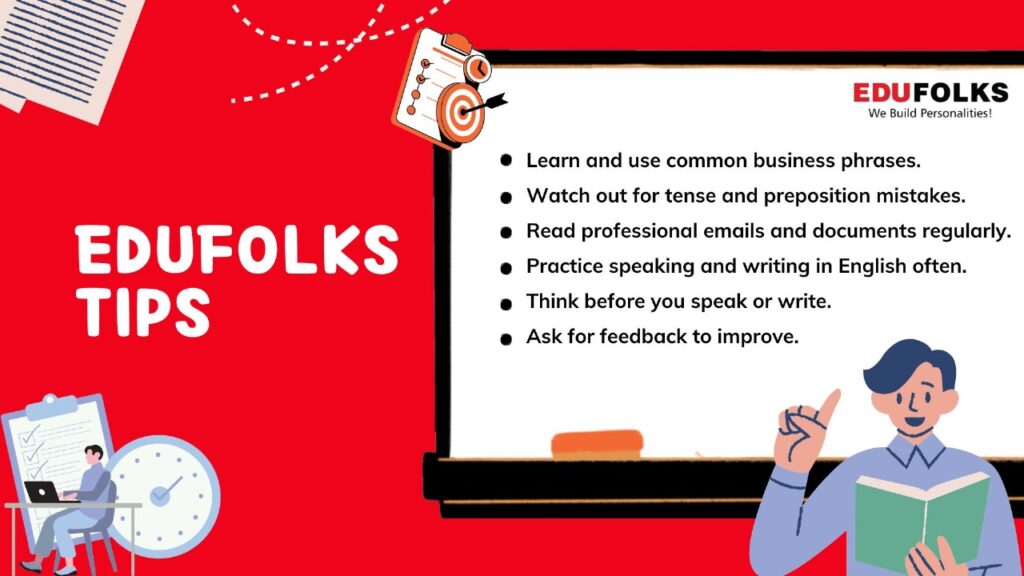Clear, professional communication is the cornerstone of success in today’s globalised workplace. Whether you’re managing teams, liaising with international clients, or drafting high-stakes reports, your use of English has a direct impact on how you’re perceived. Even highly experienced professionals can make subtle yet significant language errors that affect clarity, tone, or credibility.

In this article, we highlight five of the most frequent — and often overlooked — Business English mistakes professionals make. More importantly, we offer practical solutions for avoiding them, drawn from years of training professionals across sectors.
If you find yourself making any of these Business English mistakes, you’re not alone. The good news is that with structured practice and expert support — such as through the Edufolks Business English course — these habits can be replaced with more effective, confident communication.
5 Common Business English Mistakes & How to Avoid Them
1. Adopting an Inappropriate Register in Written Communication
The Issue:
In many workplace environments, especially where email is the primary mode of communication, professionals struggle to strike the right tone. Some come across as too informal; others sound robotic or overly stiff. Both extremes can reduce the impact of your message.
Examples of poor tone:
“Hey, just checking in…” (too casual)
“I humbly request your esteemed attention to the matter…” (excessively formal)
How to Improve:
Aim for a neutral-professional register — polite, direct, and respectful without sounding cold.
Recommended alternatives:
✅ “I hope this message finds you well.”
✅ “I’m writing to follow up on our last discussion.”
✅ “Please let me know if you require further details.”
Tip: Adjust your tone based on your relationship with the recipient and the context. Clarity should always take precedence over formality.

2. Incorrect Use of Collocations and Prepositions
The Issue:
Even at higher levels of English proficiency, many professionals misuse fixed expressions or choose the wrong prepositions in common business phrases — errors that subtly undermine the fluency of their language.
Frequent mistakes:
❌ “Responsible of managing the project”
❌ “We had a discussion about regarding the proposal”
❌ “I’m interested on your offer”
How to Improve:
Mastering collocations — words that naturally go together — is key to sounding more fluent.
Correct usage:
✅ “Responsible for managing the project”
✅ “We had a discussion about the proposal”
✅ “I’m interested in your offer”
Tip: Read widely in your industry. Exposure to native-level business writing is one of the best ways to internalise correct patterns.
3. Overly Direct Language That Lacks Diplomacy
The Issue:
Directness in business communication is valued — but only when paired with tact. Many professionals, especially non-native speakers, unintentionally come across as harsh or impolite simply because they translate phrases directly from their native language or omit softening language.
Examples of harsh phrasing:
❌ “You’re wrong.”
❌ “You didn’t send the report.”
❌ “This doesn’t make sense.”
How to Improve:
Use hedging, modal verbs, and diplomatic language to maintain professional relationships and avoid conflict.
More tactful alternatives:
✅ “I see your point, but I’d like to offer a different perspective.”
✅ “I noticed the report hasn’t been submitted yet — would you be able to share it by EOD?”
✅ “Could you clarify this part? I might have misunderstood.”
Tip: Diplomacy isn’t weakness — it’s strategic clarity. The ability to disagree or make requests without causing friction is a core business communication skill.
4. Verb Tense Inconsistencies in Reporting and Updates
The Issue:
Inconsistent or incorrect verb tenses can make your writing ambiguous — especially when discussing past performance, current tasks, or future goals.
Common errors:
❌ “Last week we discuss the new policy and decide to implement it.”
❌ “I am working on this project since March.”
❌ “We will meet yesterday with the team.”
How to Improve:
Use the correct tense based on the time frame of your message.
Correct versions:
✅ “Last week we discussed the new policy and decided to implement it.”
✅ “I have been working on this project since March.”
✅ “We met with the team yesterday.”
Tip: Don’t rush. Read your emails or reports out loud, paying close attention to time expressions (since, already, last week, currently) — they often determine the correct tense.
5. Relying on Translated or Regional Phrases
The Issue:
Even highly competent speakers fall into the trap of using phrases that are grammatically correct but regionally specific or culturally inappropriate in international contexts. These expressions are often carried over from local English variants or translated directly from a first language.
Examples:
❌ “Do the needful.”
❌ “I’m having some doubts.”
❌ “Myself Neha.”
While such expressions are widely understood in certain regions, they can sound confusing or unnatural to global audiences.
How to Improve:
Familiarise yourself with standard international English by consuming global business content — podcasts, webinars, articles, or even workplace communication on platforms like LinkedIn.
Preferred alternatives:
✅ “Please take the necessary action.”
✅ “I have a few questions.”
✅ “I’m Neha.”
Tip: Ask a mentor or colleague to review your emails occasionally, or work with a language coach to identify and eliminate fossilised errors.
How Edufolks Can Help You Refine Your Business English
Whether you’re looking to polish your presentation skills, communicate more persuasively, or simply feel more confident in meetings, Edufolks Business English course offers advanced-level training tailored to the needs of professionals like you.
Our course includes:
In-depth grammar and vocabulary workshops for professional contexts
Realistic role-plays and case studies
Personalised feedback on written and spoken communication
Guidance on workplace etiquette
Investing in your communication skills isn’t just about language — it’s about leadership, clarity, and career growth.
Join Edufolks today and make your English work for your ambition.

